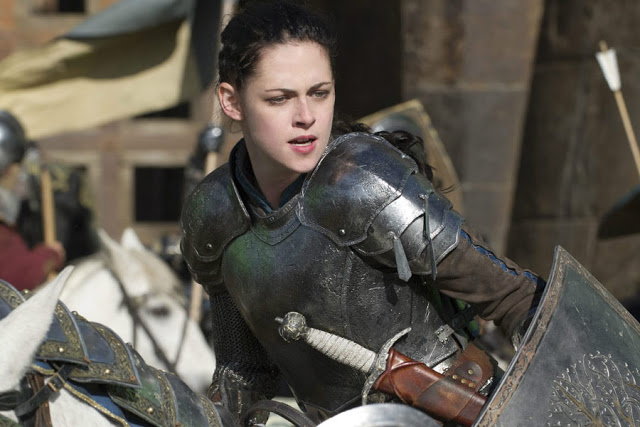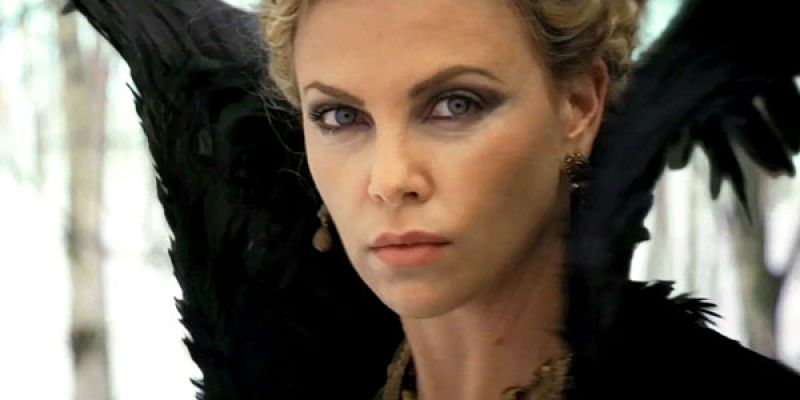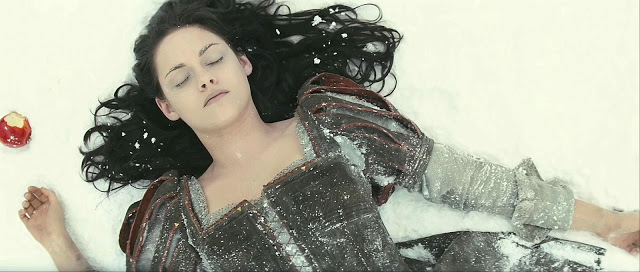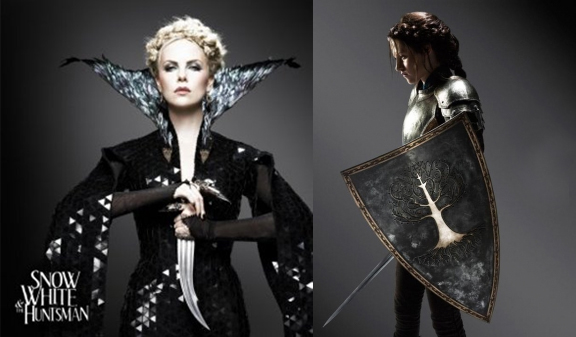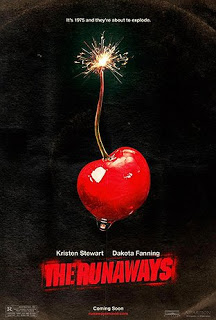Kalinda Sharma, Transgender Portrayals and CBS’s Continuing Problems: Highlights from GLAAD’s Network Responsibility Index by Alison Willmore via IndieWire
Tag: Kristen Stewart
Bitch Flicks’ Weekly Picks
Sight and Sound Magazine Expands List of Top Films of All Time to 250 and Just Seven Women Directors Make It by Melissa Silverstein via Women and Hollywood
Guest Writer Wednesday: A Feminist Review of ‘Snow White and the Huntsman’
Guest post written by Rachel Redfern originally published at Not Another Wave. Cross-posted with permission.
The fairy tale redux is the latest vogue in Hollywood and poor Snow White has been remixed and redone twice in the past year. I didn’t see the Julia Roberts and Nathan Lane adaptation, about which I heard unpleasant things (I wonder though, can anything with the brilliant Nathan Lane ever be that bad?), but the trailer looked promising, despite the presence of Kristin Stewart.
Guest Writer Wednesday: Happily Never After: The Sad (and Sexist?) Rush to Cast Some of Our Most Promising Young Actresses as Fairy Tale Princesses
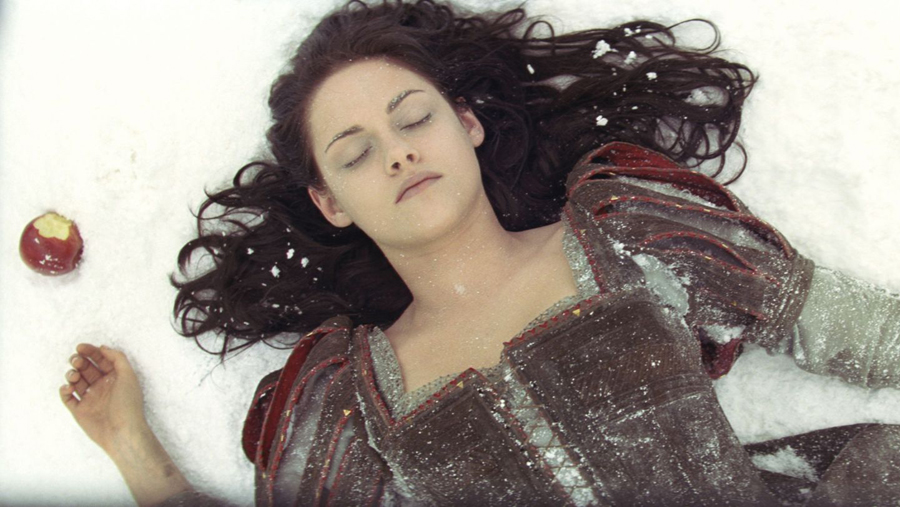 |
| Kristen Stewart as Snow White in Snow White and the Huntsman |
This guest post written by Scott Mendelson was originally published July 2011 at Mendelson’s Memos. Cross-posted with permission.
There were a few interesting articles written over the last several months about the unusual amount of ass-kicking (or at least take-charge) young female roles being written into mainstream cinema. Whether it was Chloe Moretz in Kick-Ass, Hailee Steinfeld in True Grit, Jennifer Lawrence in Winter’s Bone, or Saoirse Ronan in Hanna, the last 18 months or so has seen a mini-wave of genre pictures where young females were basically the lead characters (or in the case of Kick-Ass the star attraction), ‘strong independent character’ (god, I hate that cliche) who not only could fend for themselves but were not defined in any way, shape, or form by their male love interest (not a one of them had a boyfriend). Yes, I would include Sucker Punch in this category, as it was basically a satiric examination of whether ass-kicking young women in pop culture were automatically sexualized by virtue of the salacious nature of such imagery (stop whining and read THIS). The somewhat negative undercurrent of this trend is that these actresses were generally under 18, often barely passed puberty. Point being, what would become of these actresses once they reached adulthood? If recent developments are any indication, Hollywood has a genuine desire to roll back the progress clock and turn these actresses into fairy tale princesses.
At the moment, we now have two competing variations on Snow White set to be released in the next year. One, pictured below, will star Lily Collins (from The Blind Side and soon to be seen as Taylor Lautner’s token girlfriend in Abduction) as the titular princess, while the other will star Kristen Stewart as the ‘fairest of them all’. Both are claiming to be somewhat revisionist, and for the moment I shall take them at their word. But no matter how much armor and battle-axes you give Snow White, you’re still hiring one of our more talented actresses (say what you will about Twilight, but she absolutely sells Bella Swann and shines in the likes of Adventureland) to play a woman whose primary job is to run away from an evil witch, play house with a bunch of asexual dwarves, then finally bite a poison apple and await rescue from a theoretical Prince Charming. Of course, you could argue that Ms. Collins isn’t one of the ‘great actresses of our time’ yet. But the fact that we have two competing projects based on Snow White is a sad commentary on our times, both as a statement about how obsessed the studios are with any kind of brand recognition as well as the kind of roles available for actresses on the cusp of adulthood.
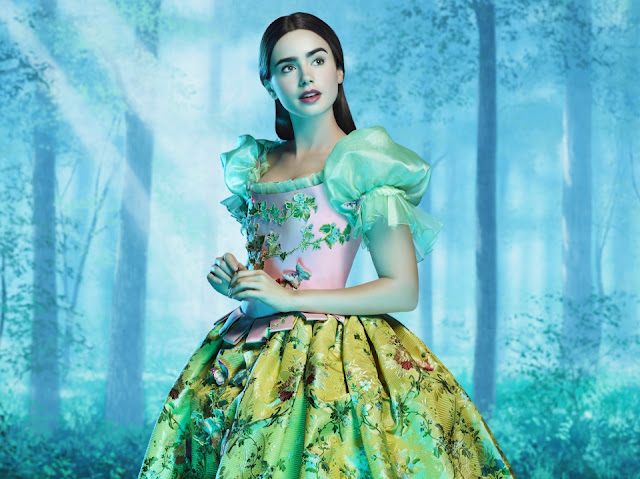 |
| Lily Collins as Snow White in Mirror, Mirror |
And it gets worse. What was Hailee Steinfeld’s reward for earning an Oscar nomination for Best Supporting Actress for a film where she was unquestionably the lead? What was her follow-up project for stealing True Grit from Jeff Bridges, Matt Damon, and Josh Brolin? She gets to play Sleeping Beauty in (yet again) a revisionist variation on that old-chestnut. And we’ll see who gets to play Princess Aurora in the other competing project, Maleficent (allegedly starring Angelina Jolie as the villain) which was to be directed by Tim Burton before he came to his senses. Worst of all (and the catalyst for this rant) is the news that Emma Watson, who portrayed one of the great feminist icons of recent times, Ms. Hermione Granger herself, is being wooed for the lead role in Guillermo del Toro’s live-action variation of yes, Beauty and the Beast. Never mind that Guillermo del Toro certainly has better things to do with his time. Never mind that we have no real need for a live-action version of “Stockholm Syndrome: The Movie” (even my 3 year old dismissed the Disney version, because she stated that the Beast was mean and a grouch). It is sadly predictable that, as soon as Ms. Watson (a fiery feminist in her own right) was able to basically play adult roles, she would be shoved into the helpless fairy-tale heroine box.
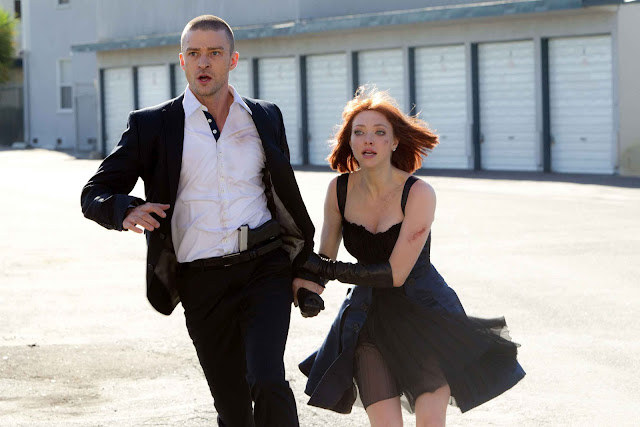 |
| Justin Timberlake and Amanda Seyfried in In Time |
And that is really the point. To be fair, it’s not an all-encompassing issue. Chloe Moretz remains fairy tale-free at this point, and Saoirse Ronan has yet to be cast in a theoretical live-action version of The Little Mermaid. She does have a ‘teen girls as hit-women’ caper with Alexis Bledel, Violet and Daisy, that I desperately want to see. And Dakota Fanning has yet to be cast as the token hot girl quite yet. But there remains a disturbing trend that allows young actresses to be vibrant and active in their onscreen fates only until they reach young adulthood. Once they are old enough to be legally sexualized, their worth as empowered heroines is seemingly lost and they end up being tasked with playing the token love interest (SEE Emily Blunt be pulled by the hand by Matt Damon in The Adjustment Bureau!), helpless hostage/potential woman in refrigerator (SEE Blake Lively as the kidnapped girlfriend of both Taylor Kitsch and Aaron Johnson in Oliver Stone’s Savages!), or both (SEE Amanda Seyfried as Justin Timberlake’s hostage who learns to love him in In Time!). It is as if female roles can only be worthwhile when they are too young to be viewed exclusively as sexual objects. Now there is a new category for which to pigeon hole these actresses: perfectly pretty princess. Once they are old enough to be cast in stereotypical female roles, it’s straight to the ‘token’ box, with an occasional diversion in fairy tale theater. Is this new mini-fad simply another variation on tokenism, or a more insidious attempt to keep said young actresses virginal and pure?
It is telling that bloggers and pundits bemoaned Jennifer Lawrence passing on Savages and picking The Hunger Games instead. Maybe, no matter how prestigious an Oliver Stone film might be (because he writes SO well for female characters…), Lawrence chose to be a lead in her own action franchise rather than play a random hottie who is abducted as a pawn in a drug spat involving her dueling boyfriends (on the surface, it seems like a prestige variation on Double Dragon). And it is telling that no one seems to notice or care that a number of our most promising young actresses are being jammed into the ‘girl cage’ just at the age when they would be old enough to play quality adult female roles. Of course, roles such as that are few and far between. For the likes of Watson and Steinfeld, it appears once again that the choice is between no mainstream roles or regressive token roles or playing a live-action Disney princess. Oh well, I’m sure they can find an episodic television series when the time comes. When it comes to quality roles for adult women, for too many actresses, it is television instead of film that is the pathway to happily ever after.
Scott Mendelson is, by hobby, a freelance film critic/pundit who specializes in box office analysis. He blogs primarily at Mendelson’s Memos while syndicating at The Huffington Post and Valley Scene Magazine. He lives in Woodland Hills, CA with his wife and two young kids where he works in a field totally unrelated to his BA in Film Theory/Criticism from Wright State University.
Guest Writer Wednesday: Snow White and the Huntsman: A Better Role Model?
 |
| Kristen Stewart as Snow White in Snow White and the Huntsman |
Even just looking at the two posters can detail the differences explicitly. The animated Snow White and the Seven Dwarfs original cover shows the princess with the classic Snow White costume: perfect hair, beautiful makeup, a sexy figure, and the adoration of birds, men, and dwarves alike. She’s actually glowing.
 |
| Movie poster for the original Snow White and the Seven Dwarfs |
 |
| Movie poster for the upcoming Snow White and the Huntsman |
While the twist that Snow White and the Huntsman presents is not necessarily a total game changer, it does offer a different side to an all too familiar story. Kristen Stewart as Snow White shows an undeniable strength as she rides her own white horse, fights her own battles, and saves her own life from the evil Queen Ravenna. Snow White’s show of strength and independence in this film help to counterbalance her lack thereof in the previous animated film adaptation of the tale. While something so simple can never completely erase past biases and prejudgments, it does highlight a growth that some films are making in portrayals of women.
We don’t expect Snow White and the Huntsman to be perfect. There is still the story that Snow White is “fairest of them all,” whose beauty causes the Evil Queen major displeasure, and there is sure to be a romantic plotline with Snow White and her Prince Charming, played by Sam Claflin of Pirates of the Caribbean: On Stranger Tides. However, we hope that this new movie focuses on the female lead as a passionate woman, capable to defend her own self, with the conviction and need to be strong on her own.
Snow White and the Huntsman is set to hit theaters June 1, 2012, and stars Kristen Stewart, Charlize Theron, Chris Hemsworth, and Bob Hoskins. You can view the trailer here.
———-
Trailers for ‘Snow White & the Huntsman’ and ‘Mirror, Mirror’ Perpetuate Stereotypes of Women, Beauty & Aging and Pit Women Against Each Other
 |
| Charlize Theron as Queen Ravenna and Kristen Stewart as Snow White in ‘Snow White and the Huntsman’ |
In the hyped Snow White and the Huntsman, the infamous fairy tale transforms into a macabre Lord of the Rings-esqe action-adventure epic. Charlize Theron (love her!), a phenomenal actor who imbues her nuanced characters with depth, based her performance of the obsessive queen on Jack Nicholson in The Shining. Sounds interesting so far, right?
The intriguing trailer focuses heavily on Queen Ravenna (Charlize Theron), who narrates or speaks almost exclusively. Okay, I kinda like that. But why doesn’t Snow White (Kristen Stewart) say anything? Why does it seem in every trailer for one of her films (ahem, Twilight series) Stewart’s character mute?? And why the fuck did they have to add “The Huntsman” in the title?! Why couldn’t it have just been “Snow White?” Or “Snow White and the Queen?” Heaven forbid a film focuses on multiple women…without a dude.
In the Snow White fairy tale, the Queen rules the kingdom she stole from heiress Snow White. But as Rebecca Cohen points out, in film versions like Snow White and the Seven Dwarves, we never see the Queen actually do anything regarding political machinations other than obsess over maintaining her fading beauty and plot to kill her stepdaughter. She possesses no ambitions beyond eternal beauty. Sadly, this film seems no different.
 |
| Queen Ravenna (Charlize Theron); ‘Snow White and the Huntsman’ |
“Do you hear that? It’s the sound of battles fought and lives lost. It once pained me to know I am the cause of such despair. But now, their cries give me strength. Beauty is my power.”

Not to be outdone, the family-friendly comedy Mirror, Mirror is also tackling Snow White. While Snow White at least speaks in this trailer, Mirror, Mirror again puts the spotlight on the Queen, this time played by Julia Roberts. In this version, the Queen isn’t envisioned as evil, just insecure. All throughout the trailer, Queen Clementianna (Julia Roberts) makes snide comments about Snow White (Lily Collins)’s beauty and how she herself isn’t getting wrinkles but “crinkles.” We see her girdle getting cinched. She uses a love potion on the rich prince, whom she wants to marry to cure her “financial troubles.” So Roberts’ Queen doesn’t even seem faux empowered like Theron. Instead she’s reduced to a shallow, insecure, bitter woman. How funny!
Now, the original Snow White isn’t an enlightened, gender equitable, female empowerment tale. Young woman plays housekeeper, cooking and cleaning for a bunch of dudes after her stepmother banishes her to the woods, who then falls into a coma after eating a poisoned apple by said stepmother, awakened with a kiss by a prince with whom she rides off into the sunset – not exactly screaming feminism. If Hollywood wanted to retell this story, why not put a twist on it?
And that’s what Snow White and the Huntsman attempts to do. In this version, Snow White (Kristen Stewart) is an armor-wearing, sword-wielding badass. Screenwriter Evan Daugherty wanted to update the fairy tale:
“What if, instead of saving Snow White, the Huntsman teaches Snow White to save herself?”
 Oooh a warrior Snow White! Potentially promising. And I like the idea of her saving herself. Except that Snow White (Kristen Stewart) is trained by…you guessed it, a dude. The Huntsman, initially ordered by Queen Ravenna to kill Snow White and cut out her heart so the Queen can consume it and live forever, decides to protect Snow White and train her for combat.
Oooh a warrior Snow White! Potentially promising. And I like the idea of her saving herself. Except that Snow White (Kristen Stewart) is trained by…you guessed it, a dude. The Huntsman, initially ordered by Queen Ravenna to kill Snow White and cut out her heart so the Queen can consume it and live forever, decides to protect Snow White and train her for combat.
“I’ve read so many stories where the prince saves the princess. It’s time we changed that.”
Snow White may be more of a badass in these retellings. But that doesn’t mean she’s feminist. The trailers for upcoming Snow White and the Huntsman and Mirror, Mirror spread a message of women, beauty and aging. They pit women against each other, particularly older women against younger women. They tell us that older women obsess over their looks, forever jealous of innocent younger women’s youth and vitality. They reinforce cattiness and competition, tossing aside the importance of female friendship and camaraderie. Oh silly ladies, you don’t need to rely on other women or even yourself. You just need a strong man to rescue you.
Really, Hollywood, haven’t we seen enough of these tired tropes? How about a truly empowered woman. Or better yet, a film with several strong female characters, who are friends, not foes. Now that, not a woman swinging a sword, would be truly radical.
—–
Trailers for Snow White and the Huntsman and Mirror, Mirror:
2011 MTV Movie Awards
Here are a selection of the winners (you can see the full list here).
Best Comedic Performance: Emma Stone for Easy A
Best Female Performance: Kristen Stewart for The Twilight Saga: Eclipse
Best Scared-As-S**t Performance: Ellen Page for Inception
Best Line from a Movie: Alexys Nycole Sanchez for Grown Ups
MTV Generation Award: Reese Witherspoon
Best Breakout Star: Chloë Grace Moretz for Kick-Ass
Biggest Badass Star: Chloë Grace Moretz for Kick-Ass
Movie Preview: The Runaways
Discussing the sexual politics of the film, Karina Longworth, of The Village Voice, says
When the band turns on Cherie for submitting to a solo soft-core photo shoot, it’s because Joan understands that unless they set the terms of their own sexual empowerment, and its commoditization, then what’s really happening is exploitation. “You could say ‘No,’ ” she tells Cherie. It’s a shock to the blonde; it’s also the thesis of the film.
